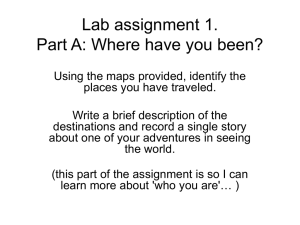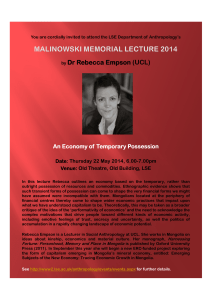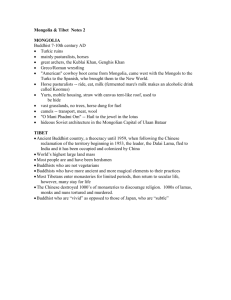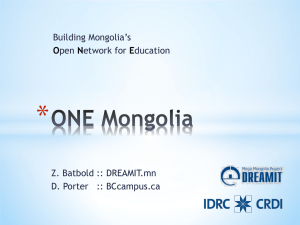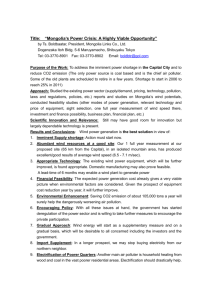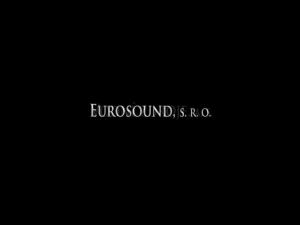SUSTAINABLE URBAN DEVELOPMENT IN MONGOLIA
advertisement
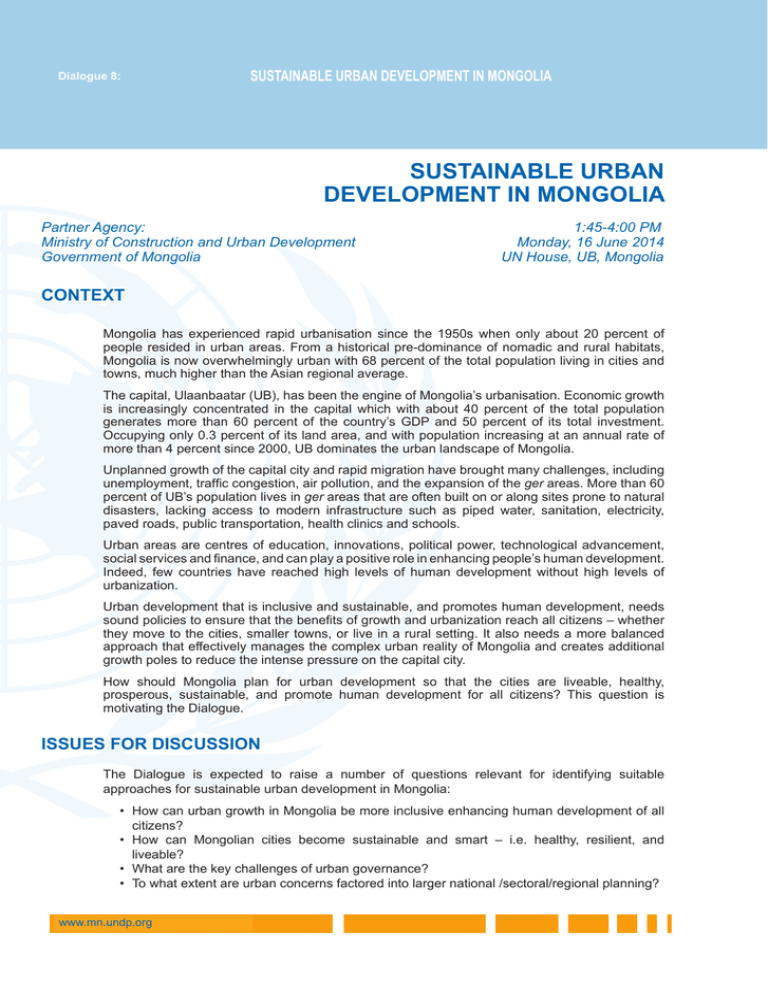
Dialogue 8: SUSTAINABLE URBAN DEVELOPMENT IN MONGOLIA SUSTAINABLE URBAN DEVELOPMENT IN MONGOLIA Partner Agency: Ministry of Construction and Urban Development Government of Mongolia 1:45-4:00 PM Monday, 16 June 2014 UN House, UB, Mongolia CONTEXT Mongolia has experienced rapid urbanisation since the 1950s when only about 20 percent of people resided in urban areas. From a historical pre-dominance of nomadic and rural habitats, Mongolia is now overwhelmingly urban with 68 percent of the total population living in cities and towns, much higher than the Asian regional average. The capital, Ulaanbaatar (UB), has been the engine of Mongolia’s urbanisation. Economic growth is increasingly concentrated in the capital which with about 40 percent of the total population generates more than 60 percent of the country’s GDP and 50 percent of its total investment. Occupying only 0.3 percent of its land area, and with population increasing at an annual rate of more than 4 percent since 2000, UB dominates the urban landscape of Mongolia. Unplanned growth of the capital city and rapid migration have brought many challenges, including unemployment, traffic congestion, air pollution, and the expansion of the ger areas. More than 60 percent of UB’s population lives in ger areas that are often built on or along sites prone to natural disasters, lacking access to modern infrastructure such as piped water, sanitation, electricity, paved roads, public transportation, health clinics and schools. Urban areas are centres of education, innovations, political power, technological advancement, social services and finance, and can play a positive role in enhancing people’s human development. Indeed, few countries have reached high levels of human development without high levels of urbanization. Urban development that is inclusive and sustainable, and promotes human development, needs sound policies to ensure that the benefits of growth and urbanization reach all citizens – whether they move to the cities, smaller towns, or live in a rural setting. It also needs a more balanced approach that effectively manages the complex urban reality of Mongolia and creates additional growth poles to reduce the intense pressure on the capital city. How should Mongolia plan for urban development so that the cities are liveable, healthy, prosperous, sustainable, and promote human development for all citizens? This question is motivating the Dialogue. ISSUES FOR DISCUSSION The Dialogue is expected to raise a number of questions relevant for identifying suitable approaches for sustainable urban development in Mongolia: • How can urban growth in Mongolia be more inclusive enhancing human development of all citizens? • How can Mongolian cities become sustainable and smart – i.e. healthy, resilient, and liveable? • What are the key challenges of urban governance? • To what extent are urban concerns factored into larger national /sectoral/regional planning? www.mn.undp.org SUSTAINABLE URBAN DEVELOPMENT IN MONGOLIA Dialogue 8: DIALOGUE STRUCTURE The Dialogue will be organized as a Panel Discussion. Prior to the start of the panel discussion there will be a brief presentation of the issues to structure the discussion. The panel discussion will be followed by an open exchange of views among participants. AGENDA 13:45 Registration and Tea/Coffee 14:00-14:20 Welcome remarks • Ms. Sezin Sinanoglu, UNDP Resident Representative Opening remarks • H.E. Mr. Ts.Bayarsaikhan, Minister of Construction and Urban Development • Mr. E. Bat-Uul, Mayor of Ulaanbaatar City Keynote speech • Mr. Haoliang Xu, UN Assistant Secretary-General and Assistant Administrator and Regional Director for the Regional Bureau for Asia and the Pacific in the United Nations Development Programme (UNDP) 14:20-14:45 Presentation on “Sustainable Urban Development in Mongolia: The Key Issues” • Mr. Joseph D’Cruz, Regional Team Leader, Inclusive Growth, Asia Pacific Regional Centre, UNDP 14:45-15:30 Panel Discussion Moderator Mr. Saurabh Sinha, Senior Economist, UNDP Panelists Ms. D. Altantuya, Director of “Shine zuun ger khoroolol” NGO Mr. L. Myagmarjav, Vice President of MCS group Ms. A. Enkhjargal, Public Health Professional Association Ms. B. Tuul, Head of the Steering Committee for Public Utility Mr. J. Tsendsuren, Governor of Zuunmod Soum, Tuv Aimag Mr. G. Batbayar, Member of Darkhan Local Khural 15:30-15:55 Open discussion 15:55-16:00 Closing remarks • Ministry of Construction and Urban Development • Mr. Thomas Eriksson, UNDP Deputy Resident Representative www.mn.undp.org
